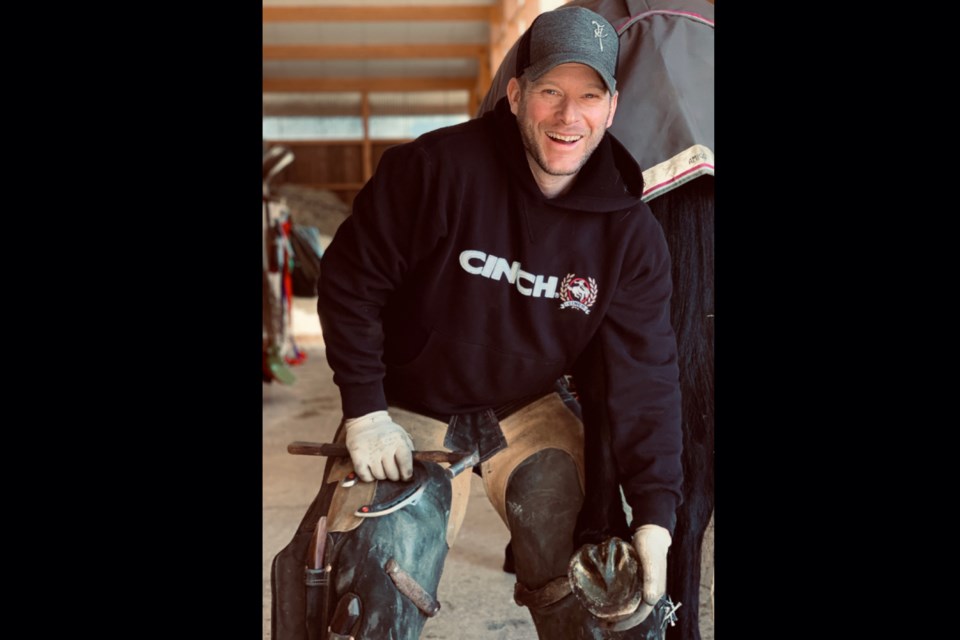MOUNTAIN VIEW COUNTY – In the relatively short span of time since a farrier from Switzerland relocated his family west of Sundre more than a year ago, he was able to build up from scratch a loaded base of clients.
But while business is good, it wasn’t necessarily economic opportunity that compelled Tom Haas to bring his family all the way from Europe to Alberta’s foothills and start his own company called TH Horseshoeing Corp.
“I was pretty busy in Switzerland,” Haas told the Albertan during a recent phone interview, adding his hands were quite full at the time.
First becoming an apprenticed blacksmith in Switzerland, he eventually transferred to the farrier industry in 1998 before serving in Switzerland’s military, also as farrier looking after the army’s mounts.
“We still have horses in the mountains,” he said. “In Switzerland, the rule (is) when no tank or no truck works, we bring in the horses.”
The 44-year-old has accumulated a vast repertoire of experience since becoming a farrier about 28 years ago and had plenty of opportunities to keep him busy in Switzerland.
“So why we moved,” he said, “it’s not because of the work. It’s because of the heart. We followed our passion to have our own property and stay a little bit outside of town and enjoy nature.”
At first, starting the new business from the ground up – not only in a new community but a whole different country – was challenging.
“I was waiting for somebody to call me,” said Haas.
“I had to build up my business here,” he said, adding that nobody knew him at the time and that he’s managed to develop a network after marketing himself online as well as through word of mouth with some of the region’s veterinary clinics.
“And now, I’m really pretty busy,” he said. “I work also with the veterinarians and I do a lot of therapeutic shoeing.”
While every day tends to be a little different, he on average clocks about 10-hour days throughout the work week. The work involved is laborious, so Haas makes sure to find time to rest and recharge.
With perhaps a few exceptional circumstances, he said, “I never work on the weekends.”
These days, he’s essentially reached his capacity to take on more clients.
“Now, I’m actually fully booked,” he said. “In the beginning, it was not like that.”
The only reason he was able to accommodate a mid-week interview was on account of the temperature’s sudden plunge into a deep freeze.
“I’m at home because of the cold,” he said. “Normally, I work every day and I’m fully booked. But this morning was -30 (C) and all my clients, they cancelled me.”
While Haas has a mobile trailer unit and regularly finds himself on the road, he also rents space to get set up twice a week at Timber River Station so clients can haul in their animals. That service is also always booked, he said.
Asked about how many clients is able to handle in a given week, he said it varies and depends on the jobs.
But for example, Haas said that generally speaking, he is able to complete four full sets of horseshoes as well as eight to 10 trims, or shaping hooves, every work day.
Horseshoeing and trimming are his most sought-out services, but Haas also provides a weekly corrective therapeutic treatment for horses that are recovering from disease or injury in collaboration with veterinarians at Coolie Equine east of Olds.
Like any business, he has operational costs to consider. Expenses include insurance coverage, keeping stocked up on supplies from horseshoes to nails as well as materials including a variety of tools to renting space at Timber River Station. But he said the biggest cost involved in running the business is gas.
The costs involved in the equine community make working in the industry challenging, and Haas said veterinarians and farriers, as well as perhaps larger boarding or stabling shops, are pretty well the only ones who can survive.
Although Haas said he is happy with how things have turned out since moving to the Sundre area, the farrier isn’t sure he’ll be able to indefinitely maintain his momentum until retirement.
Replying to a question about whether he envisions himself pursuing any other paths in the future, he said, “Maybe. Every day I think about that because it’s really hard on my back (and) on my body.”
For the time being, however, he is in no rush to change career paths and said he’ll reassess perhaps in another decade or so.
“My body will tell me that,” he said.
Although he also has an interest in crafting leather, he said that line of work just isn’t lucrative enough to be sustainable.
“I don’t know what I want to do in the future,” he said, adding followed by laughter, “Tell me when you got an idea.”



